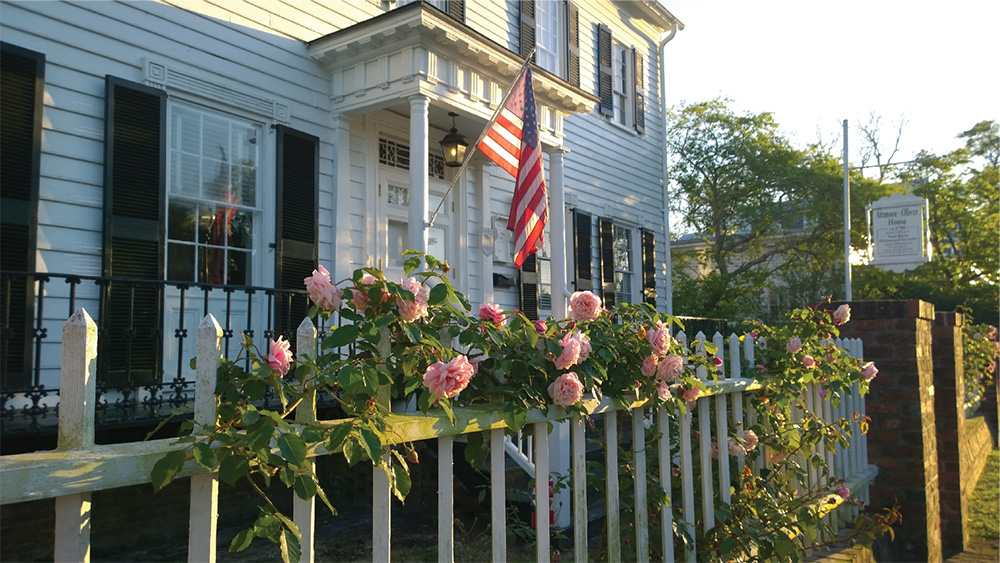In Celebration of Women's History Month
by Claudia Houston, Historian, New Bern Historical Society
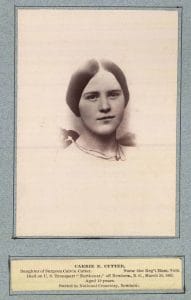
This month marks the 160th anniversary of the first Battle of New Bern, fought on March 14, 1862, one of several engagements in Burnside’s North Carolina Expedition. It is also celebrated as Women’s History Month, making it an appropriate time to tell the tragic story of a young Civil War nurse, Carrie Cutter, who was part of the Burnside Expedition.
Born in 1842, Carrie Eliza Cutter was the daughter of Dr. Calvin Cutter, a surgeon, abolitionist, and author of Cutter’s School Physiologies. During the Civil War, Dr. Cutter became the surgeon for the 21st Massachusetts Volunteers. Carrie was educated at Professor Russell’s private seminary in Lancaster, Massachusetts as well as Mount Holyoke Female Seminary. She also attended a private German school in Pennsylvania. After her graduation from Mount Holyoke in 1861, Carrie planned to sail to Europe to tour and study for three years. Her plans were put to an end by the attack on Ft. Sumter in Charleston Harbor and the start of the Civil War.
Carrie initially helped the war effort by raising funds for Union uniforms and supplies, but she wanted to join her father in his medical efforts. She was able to finally join her father at camp at the Naval Academy in Annapolis during October 1861. When the Burnside Expedition left for North Carolina, she joined the 21st Massachusetts as a nurse for the regiment. She sailed with the expedition on the steamship 'Northerner,' and during the Battle of Roanoke Island she stayed onboard to care for the wounded. When the battle was over, Carrie went ashore to assist with the wounded, particularly three wounded German men who in their delirium could not remember how to speak English. With her German fluency, Carrie was able to assist them.
Also aboard the Northerner was Carrie’s sweetheart, Charles Plummer. Like his good friend and Carrie’s father, Dr. Cutter, Plummer was an avid abolitionist and member of John Brown’s Army. Although his full given name was Charles Plummer Tidd, when John Brown was arrested during the raid at Harper’s Ferry, Tidd was able to escape. He dropped his last name to avoid capture and eventually signed up with the 21st Massachusetts using the alias Charles Plummer.
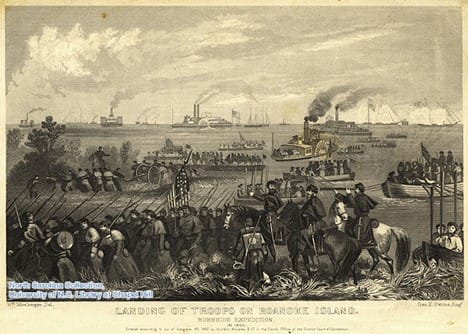
During the Battle of Roanoke Island Charles was severely ill of typhoid fever aboard the Northerner. Carrie attempted to nurse him back to health, but he died on Feb 8,1862 and was buried on Roanoke Island. When the battle ended, Carrie continued her nursing activities on land as well as on board ship. Sadly, those rigors and her exposure to disease led her to contract typhoid fever and she died aboard the Northerner just six weeks later, on March 24, 1862. She was only nineteen years of age.
Carrie had asked that she be buried next to the man she loved. Remarkably, General Burnside ordered her to be buried with full military honors on Roanoke Island next to her fiancé. When the National Cemetery opened, Congress granted special permission for Cutter to be interred there. Her remains and those of Charles Plummer Tidd were later reinterred at New Bern National Cemetery. Carrie is buried in Section 10, grave 1698. Charles is thought to be buried in Grave 1697 though the grave is mysteriously marked as Charles Coledge. Whether this was simply a mistake or an alias used to avoid defacement is not known, but it is now believed that it is, indeed Charles Plummer Tidd who lies next to his beloved Carrie.
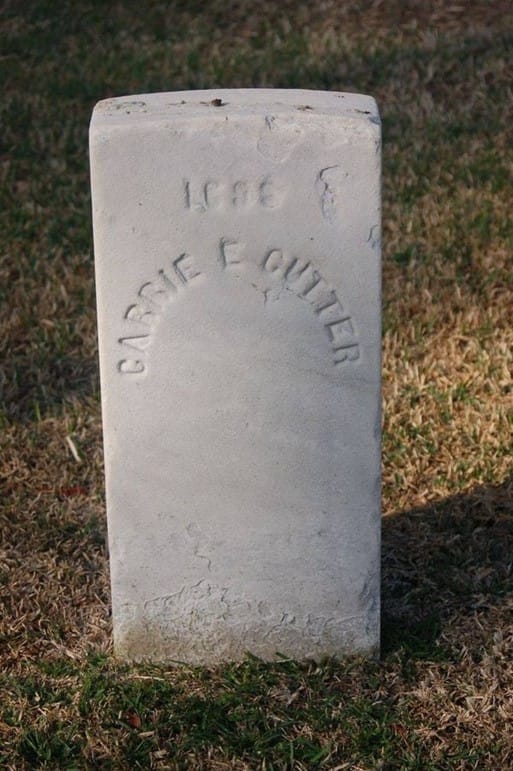
Carrie is also commemorated at the Elm Street Cemetery in her birthplace of Milford, New Hampshire, and her name is inscribed in bronze on the soldiers' monument in Warren, Massachusetts, the residence of her father (Find A Grave Memorial# 3258316).
The famous Civil War nurse, Clara Barton, authored a poem in which she honored early nurses, including Carrie Cutter. Here is an excerpt:
The women who went to the field, you say,
The women who went to the field; and pray
What did they go for? just to be in the way!-
They'd not know the difference betwixt work and play,
What did they know about war anyway?
What could they do? - of what use could they be?
They would scream at the sight of a gun, don't you see?
...
And who were they all? - They were many, my men:
Their record was kept by no tabular pen:
They exist in traditions from father to son.
Who recalls, in dim memory, now here and there one.-
A few names where writ, and by chance live to-day;
But's a perishing record fast fading away.
Of those we recall, there are scarcely a score,
Dix, Dame, Bickerdyke, - Edson, Harvey and Moore,
Fales, Wittenmeyer, Gilson, Safford and Lee,
And poor Cutter dead in the sands of the sea;
...
And these were the women who went to the war:
The women of question; what did they go for?
Because in their hearts God had planted the seed
Of pity for woe, and help for its need;
They saw, in high purpose, a duty to do,
And the armor of right broke the barriers through.
Uninvited, unaided, unsanctioned ofttimes,
With pass, or without it, they pressed on the lines;
They pressed, they implored, till they ran the lines through,
And this was the "running" the men saw them do.
'T was a hampered work, its worth largely lost;
'T was hindrance, and pain, and effort, and cost:
But through these came knowledge, - knowledge is power.-
And never again in the deadliest hour
Of war or of peace shall we be so beset
To accomplish the purpose our spirits have met.
And what would they do if war came again?
The scarlet cross floats where all was blank then.
They would bind on their "brassards" and march to the fray,
And the man liveth not who could say to them nay;
They would stand with you now, as they stood with you then,
The nurses, consolers, and saviours of men.
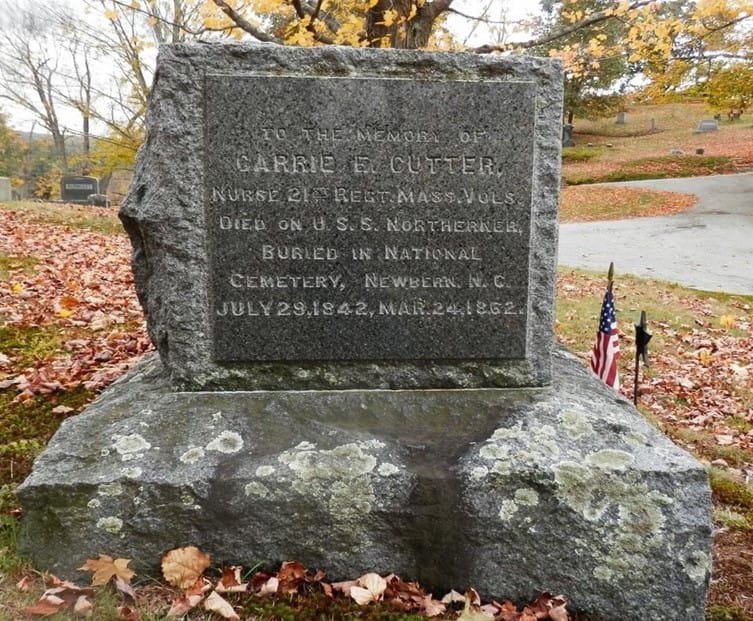
One of the first women to die in the Civil War and the first woman to be buried at New Bern National Cemetery, young Carrie Cutter will always be remembered by her nickname, the “Florence Nightingale of the 21st”.
See the full poem "The Women Who Went to the Field" by Clara Barton here.

